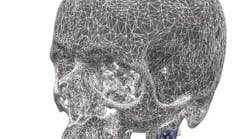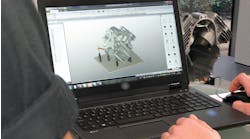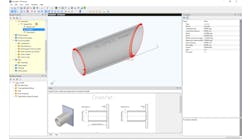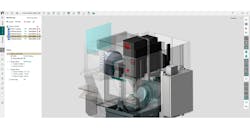Process speed and accuracy improve performance, for manufacturers’ and patients’ benefit.
Delcam is due to introduce several software programs it developed especially for medical professionals to design devices and streamline production processes, at the same time reducing patient trauma and reducing waiting times. Specifically, the new products include Dental and Orthotic software releases that increase the level of consistency and accuracy compared to other CAD/CAM systems, to reduce the need for manual adjustments.” The new developments will be presented November 3-4 at SME’s Manufacturing Innovations – Medical Canada, at the International Centre in Mississauga, Ontario.
These new releases are the result of a Healthcare division that Delcam established last year to improve its focus on machining parts and components for medical, surgical, and dental applications, an increasingly important part of its business. The division helps companies across those industries to apply Delcam’s expertise and experience and take advantage of design and manufacturing developments.
Also due to be presented at Manufacturing Innovations will be PowerMILL 2010, Delcam’s solution for the machining of complex shapes; and PartMaker, Delcam’s solution for automating the programming of the complex multi-axis, turn-mill centers and Swiss-type lathes, often found in the medical device sector. PowerINSPECT, Delcam’s software for automating the inspection process across a variety of metrology hardware platforms will be shown, too.
“Companies in the healthcare industry face the same demands from their patients that our traditional engineering clients see from their customers for faster delivery of better and cheaper products,” explained Delcam’s VP Mark Cadogan. “Patients want to receive higher-quality products and services, and they want to complete their treatment in the shortest-possible time. At the same time, healthcare companies are under pressure to provide this higher quality at lower cost and to increase their productivity to meet the growing demand. These requirements can only be met through the application of more advanced and more automated technology.”
Cadogan said Delcam’s new Dental software and Orthotic software releases offer higher levels of consistency and accuracy than other CAD/CAM systems. The complete OrthoModel/OrthoMill process is driven by a series of easy-to-use menus that incorporate the specific terminology used in the industry to describe the various features of the orthotic. This ensures that the system can be used by technicians in the industry without any need for extensive training in general CAD/CAM technology.
Cadogan’s view was seconded by by Geier Markus of Diadem Precision Technology, a supplier of milling centers for dental labs. "Delcam’s Dental CAD/CAM solution offers unprecedented accuracy, which results in restorations that have a high quality of fit every time,” Markus said. "It means that Diadem can maintain the very high standards that dental clinics and dental laboratories have come to expect from us. This is only possible with a strong and reliable CADCAM software partner like Delcam.”
Maida Koller, business development manager of Delcam’s Orthotics business emphasized the importance of collaborators from the medical industry in the software development process. “We like to test all our software in real applications with real deadlines before we release it,” Koller explained “This essential part of the development process ensures that the software works in the way that we expect and also enables us to test the ease of use for people in the industry.”
In addition to the new software products for medical applications in dental and orthotics Delcam has extended its range of hardware for the healthcare industry with the launch of scanners, both fully integrated with the company’s software for the design processes. Both of the Delcam iMetric scanner (for Dental) and the iQube scanner (for Orthotics) use the latest in scanning technology, combined with precision calibration, to provide highly accurate data. The high level of accuracy ensures that the resulting CAD is fit perfectly to the patient.






